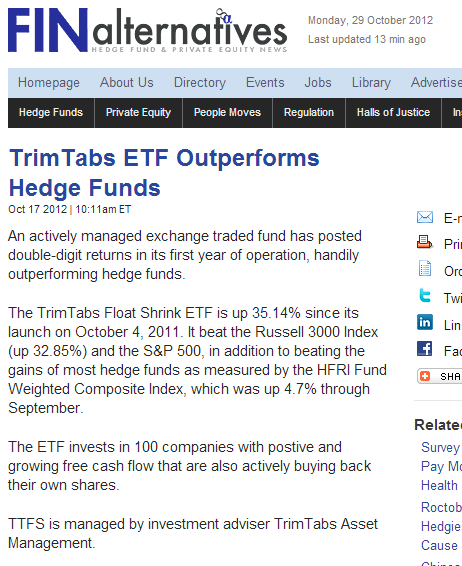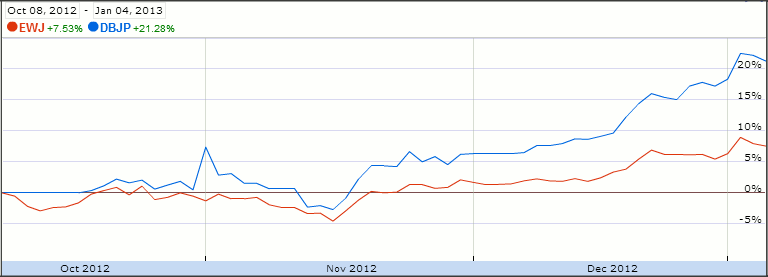ETF Strategy That Outperforms Hedge Funds
Post on: 7 Май, 2015 No Comment

By Stanislaw Zarzycki and Ken Marshall
John Maynard Keynes, the curmudgeonly economist, once said The difficulty lies not so much in developing new ideas as in escaping from old ones One of the more intriguing new ideas to hit the mutual fund industry over last few years has been their adoption of hedge fund strategies. These alternative mutual funds hold out the promise of delivering hedge fund-like returns, without the high fees, to the retail investor.
Firms like UBS, Goldman Sachs and hedge fund giant AQR have opened numerous mutual funds offering small clients access to esoteric strategies like ‘tactical macro’ or ‘ statistical arbitrage’ and derivatives trading. The allure of the old idea — earning outsized returns like those of George Soros, John Paulson or Steve Cohen — may explain the appeal of these new mutual funds to retail investors. Or investors may be intrigued by the possibility of better diversification.
But have these new alternative mutual funds lived up to the old hedge fund ideals of delivering alpha? And what is the ideal by which to measure their effectiveness compared to the conventional equity income investment style? Should one park their cash in alternative investment mutual funds or stick to a classical allocation to stock ETFs and bond ETFs? To get some answers, we decided to do what Keynes would have done: we looked at the facts.
Using Morningstar Enhanced mutual fund database, we narrowed down the list of some 300 alternative mutual funds based on a minimum track record of 2 years to 119 investment vehicles. For the whole group the average annualized return over the two-year period (2011-2012) was a mere -0.025% with an average standard deviation of 7%. The annualized returns ranged from 7.3% to -32.4%. The average Sharpe ratio achieved was 0.26. In contrast, the S&P 500 over the same period had an annual return of +8.83% and standard deviation of 9.8%.
Perhaps the more appropriate basis of comparison is the actual hedge fund index (HFRX Global Hedge Fund Index). Here the results seem more promising (see chart 1). Over this same period, the HFRX Global Hedge Fund Index woefully annualized at -2.3%, with a standard deviation of 4.5% and Sharpe of -0.39. If we create an equally weighted alternative mutual funds index, we can readily compare the two:
To be the best-house-on-a-bad-block may not be the bragging rights you want, however. Why even stay in the neighborhood? If hedge funds don’t deliver alpha to their own investors, how is it possible they can do so for the retail mutual fund investor?
This is not a rhetorical question. It goes to the heart of how investors’ interests are best served. Let’s frame this as a testable hypothesis: retail investors are better served if they can access hedge fund strategies; or retail investors are better served if they utilize conventional investments expressed as ETFs.
We set up a very simple test. We ran one allocation strategy comprised of two ETFs: 50% in SPY (SPDR S&P 500 ETF Trust) and 50% in TLT (iShares Barclays 20+ Year Treasury Bond) which were rebalanced monthly to maintain equal weighting. The other allocation strategy used our alternative mutual fund index (see graph 2).
Not only did the simple 50:50 SPY TLT allocation deliver higher absolute returns but also delivered better risk adjusted returns:
To determine if the premise is flawed, we extended our analysis to the Hedge Fund Index over a longer, 10-year period (not wanting to commit an error of choosing a biased time period). We then compared our simple 50:50 SPY-TLT allocation to the HFRX Global Hedge Fund Index as far as data allowed to July 2002:

We find a similar outcome -better historical returns with a simpler investment strategy.
Performance is one way of measuring alpha. Another, in the case of hedge fund strategies, is the benefit from diversification. Hedge funds, it is argued, provide diversification through lower correlations to other asset classes, especially stocks. In the long run, should one allocate to hedge funds (or alternative mutual funds) because they provide better protection during times of market dislocations? If we use the same data going back to July 2002, we get similar results. The table below clearly shows that the difference in correlations to the S&P 500 Index between a simple 50:50 SPY TLT model and HFRX Global Hedge Fund Index is negligible:
What is also curious is the hedge fund complex does not provide any more protection during down stock market months (represented by the Down Capture Ratio -calculated by dividing the manager’s returns by the returns of the index during the down market and multiplying it by 100) than the simple investment model using ETFs.
Better a thing roughly right than precisely wrong, Keynes would have said. Indeed, our analysis suggests that the alternative mutual fund space is not even roughly right, but that the hedge fund complex may be precisely wrong. Granted, it is possible for selected hedge fund managers to deliver outsized returns over a specific period of time. Finding those selected managers is a topic for another article. As for the idea of hedge funds re-inventing themselves as alternative mutual funds, we can understand the appeal of the new but the performance benefits are simply not evident from the data.
Ironically, McKinsey & Co. predicts that retail alternative mutual funds will become part of the mainstream market in the years to come. If we let the data speak instead, it is clear investor interests are better served in sticking with what you know rather than what is new. ETFs are still the best roughly right alternative and a simple 50:50 SPY TLT rebalancing strategy can deliver superior returns.
Disclosure: I am long SPY. TLT. I wrote this article myself, and it expresses my own opinions. I am not receiving compensation for it (other than from Seeking Alpha). I have no business relationship with any company whose stock is mentioned in this article.














